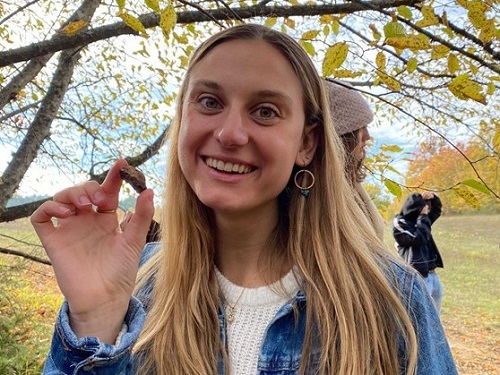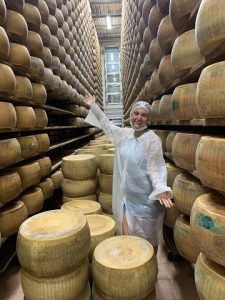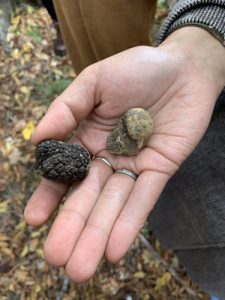My Reflections on the Food, Sustainability & the Environment Program

By Umbra Rep Lauren Pawlowski, University of Connecticut
The Food, Sustainability & Environment Program (FSE) made my semester abroad in Italy unforgettable! Participating in immersive learning experiences, such as culinary workshops and tours of food production facilities, allowed me to learn more about Italian food and culture outside of the classroom. This included workshops on cheese making, coffee roasting, and a series of cooking demonstrations. We also had the opportunity to go truffle hunting and visit multiple butcheries, just to name a few more experiences. The FSE made me reflect on food systems, local traditions, and environmental sustainability in a way that I never would have the opportunity to do in the United States. I will continue to think of these lessons and utilize the perspectives I’ve gained throughout my career in sustainability.
 One of my best weekends abroad was when the FSE visited Parma and Modena to tour the Parmigiano Reggiano cheese, Modena Balsamic Vinegar, and Prosciutto di Parma production facilities. Having local food producers walk us through the process of creating these traditional products was an incredible experience, one that I probably would not have gotten if I had studied abroad in a different country. For example, the appellation and DOP/DOCG region system is something that sets Italy apart from the US and other countries for food and wine production. Certifying products from these areas ensures top quality and preserves Italian food culture, but being limited to the specific region boundaries makes it harder for producers and farmers to adapt to changing climate conditions. For example, within the last few decades, the Parmigiano Reggiano cheese producers have had to use air conditioning in their facilities to maintain the correct cheese temperature and they changed the cow breed they use to make the milk. The cheese-making facility also has stainless steel machinery and copper cauldrons for a sanitary production process. This is where the blend of traditional artisanal production techniques and modern technology is critical to maintaining sustainability, of both the business and the local cuisine. And it was a unique experience for me to explore these sustainable examples of food production that exemplify a middle ground between small family farms and massive industrial facilities. This is something that is hard to imagine and get the opportunity to see in the United States.
One of my best weekends abroad was when the FSE visited Parma and Modena to tour the Parmigiano Reggiano cheese, Modena Balsamic Vinegar, and Prosciutto di Parma production facilities. Having local food producers walk us through the process of creating these traditional products was an incredible experience, one that I probably would not have gotten if I had studied abroad in a different country. For example, the appellation and DOP/DOCG region system is something that sets Italy apart from the US and other countries for food and wine production. Certifying products from these areas ensures top quality and preserves Italian food culture, but being limited to the specific region boundaries makes it harder for producers and farmers to adapt to changing climate conditions. For example, within the last few decades, the Parmigiano Reggiano cheese producers have had to use air conditioning in their facilities to maintain the correct cheese temperature and they changed the cow breed they use to make the milk. The cheese-making facility also has stainless steel machinery and copper cauldrons for a sanitary production process. This is where the blend of traditional artisanal production techniques and modern technology is critical to maintaining sustainability, of both the business and the local cuisine. And it was a unique experience for me to explore these sustainable examples of food production that exemplify a middle ground between small family farms and massive industrial facilities. This is something that is hard to imagine and get the opportunity to see in the United States.
Talking first-hand with locals who are proud of where they live and how they produce their food using artisanal techniques was inspiring. There is an appreciation for food production here that is difficult to find in the US, where concentrated animal feeding operations (CAFOs) and fast food places reign supreme. The appreciation for food culture in Italy is exemplified by the abundance of agriturismo locations throughout the country, where hospitality and food production combine to create an educational experience for visitors and tourists. This promotes environmental sustainability, because of the transparency in operations, support for local food systems, and utilization of organic or regenerative farming practices. These are also important values of the Slow Food movement, which originated in Italy. Throughout my travels and FSSP experiences, I had the chance to eat at many Slow Food restaurants, where the managers create strong relationships with every food producer they source ingredients from and they serve only a seasonal food menu. The Slow Food movement is not popular in the US, along with agriturismo locations, so these were very rewarding to see in Italy. Overall, the FSE opened my eyes to the world of Italian cuisine and made me appreciate the local food producers across different regions of the country. This was exactly the type of global experience that I was looking forward to when I applied to study abroad, and there is no better place to learn about food than in the heart of Italy.
 Not only did we participate in facility and farm tours and educational presentations, but we also got to sample the delicious dishes at each of the trip locations! Some of the best meals I’ve had in Italy and in my lifetime have been on the FSE field trips, including gnocchi with truffle oil during the truffle hunting field trip and 25-year aged balsamic vinegar on vanilla gelato in Modena.
Not only did we participate in facility and farm tours and educational presentations, but we also got to sample the delicious dishes at each of the trip locations! Some of the best meals I’ve had in Italy and in my lifetime have been on the FSE field trips, including gnocchi with truffle oil during the truffle hunting field trip and 25-year aged balsamic vinegar on vanilla gelato in Modena.
It was rewarding to be a part of the group of FSE students who were eager to learn along with me and to try the best of what Italy had to offer. I am forever grateful for these special memories and for the families and locals who shared their knowledge, culture, and traditions with us!
For more information about the FSE Program, click here .